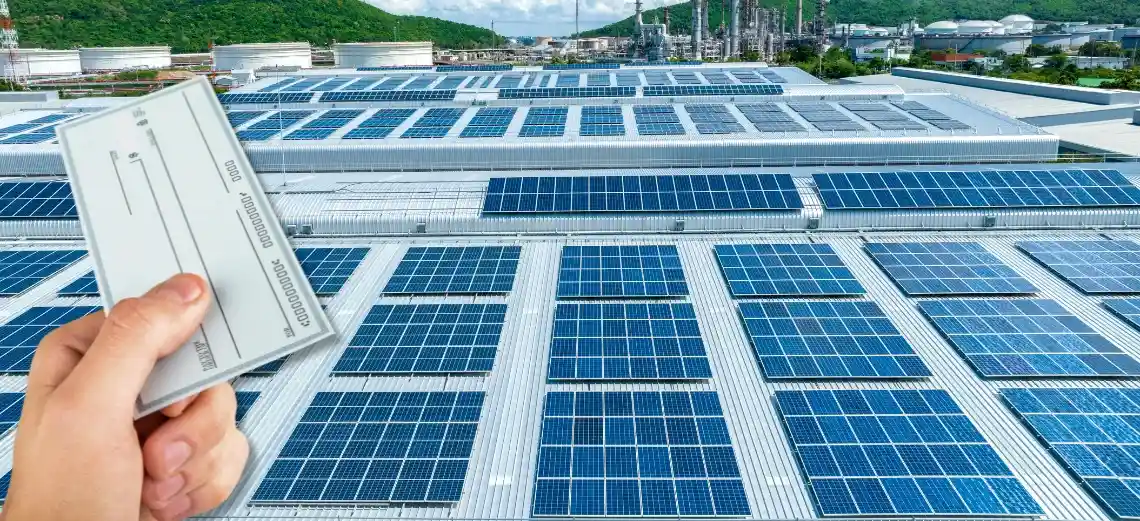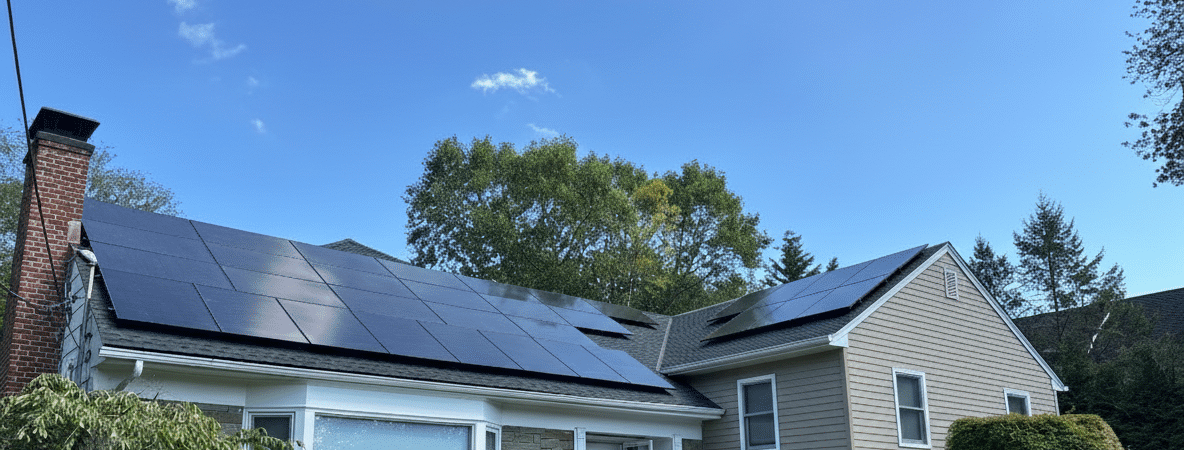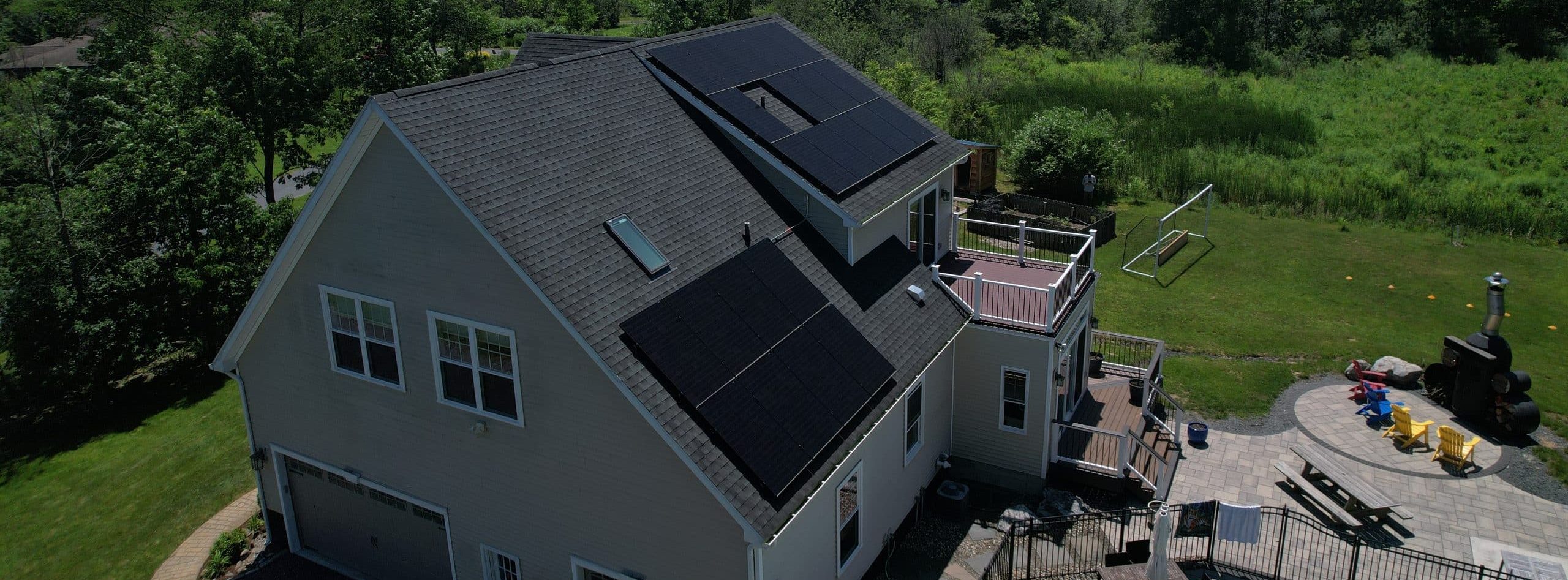[vc_row kd_background_image_position=”vc_row-bg-position-top”][vc_column][vc_column_text]
In today’s imperative world for solar power, small businesses are gaining prominences by adopting eco-friendly practices. Embracing solar power is a significant advancement, offering benefits like reduced carbon emissions and lower operational expenses. However, financial challenges often hinder this transition. To address this, solar power grants tailored for small businesses have emerged as a hopeful solution.
Solar grants provide a valuable chance for small business owners to achieve both sustainability goals and economic viability. Whether operating a café, a retail store or having any startup business in your town, getting solar power grants can be a crucial move towards a future where you don’t have to rely on fossil fuels for energy. This blog will explain solar power grants for small businesses and cover various aspects, including grant types and the complex process of renewable energy funding. Let’s discuss it!
What Are Solar Power Grants for Small Companies?
Solar power grants are financial incentives given by the government and non-profit organizations to encourage small businesses to use solar energy systems. The main goal of these grants is to encourage the use of clean and sustainable energy sources, cut greenhouse gas emissions, and help the earth stay healthy as a whole.
Solar power grants for a small commercial solar company can cover various aspects of the solar installation process, including:
Costs of Solar Equipment: Grants cover part of the expenses related to purchasing and installing solar panels, inverters, batteries, and other necessary components.
Designing & Building: Grants help you pay for planning, designing, and building the solar system to make sure it works well and meets the energy needs of your business.
Costs of Permits & Inspections: Some grants cover the costs of getting permits and doing inspections for the solar system.
Technical Assistance: Solar Power Grants may pay for your small business to hire consultants or other experts to help you set up and manage your solar energy system.
Energy Efficiency Measures: In some cases, funds and energy efficiency measures could be used together to make the business more sustainable as a whole.
Where Can You Find Solar Power Grants for Small Businesses?
The U.S. Department of Energy (DOE) offers various solar grants and funding opportunities to support solar energy research, development, and deployment. These grants are typically aimed at advancing solar technologies, improving manufacturing processes, and promoting the use of solar energy in various sectors, including small businesses. This online platform has an extensive selection of solar grant opportunities, so people can learn about how grants work and what they need to do to qualify. Additionally, users can subscribe for email notifications whenever novel grants are announced. A selection of the primary grants encompasses:
Grants for High Costs of Energy
U.S. Department of Agriculture
The USDA made solar power funds to help rural areas improve their energy production in places with high energy costs. These funds are used to purchase, design, install, fix, replace, or improve solar energy systems, whether they are on or off the grid.
Grants for Renewable Energy
U.S. Department of the Treasury
This incentive, also known as “the Section 1603 program”, pays back for some of the cost of installing a solar system instead of giving tax credits. People will receive benefits after the energy system is set up and working efficiently. They should first pay for the solar energy system and its installation to get benefits.
Grants for REAP
The U.S. Department of Agriculture
The Rural Energy for America Program supports farmers and small rural businesses in obtaining & installing renewable energy systems through grants of up to $20,000. Recipients can also enhance existing energy-saving tools with the grant. Research on small business solar power grants for utilizing solar power on farms not only reduces costs but also promotes clean energy.
Additionally, the Inflation Reduction Act allocated nearly $2 billion in funds for REAP until 2031, aiding agricultural producers and solar businesses in rural areas to enhance energy efficiency. The program is a government incentive for small rural businesses and farmers to adopt solar panel systems and boost energy efficiency. Each year, the cost of installing solar panels keeps getting lower.
You can also have the benefits of both the REAP grant and the Federal Tax of 30% that comes with solar panel installation for your small business. This, along with other state benefits, can help you save a lot of money on the costs of going solar. So why are you waiting? Check your eligibility criteria for business solar power grants such as REAP and experience numerous benefits of going solar with your business.
How the REAP Program Supports Energy Efficiency and Solar Installations
The Rural Energy for America Program (REAP), initiated by the United States Department of Agriculture, plays a pivotal role in empowering small and rural businesses, as well as farmers, to enhance energy efficiency and integrate solar solutions.
Financial Incentives
REAP offers valuable financial support to eligible participants. Here’s how it works:
- Grants and Loans: The program provides both grants and low-interest loans, making it financially feasible for businesses to invest in energy-efficient technologies and solar systems.
Energy Efficiency Upgrades
Energy efficiency is critical for reducing operational costs. With REAP:
- Access to State-of-the-Art Technology: Businesses can afford energy-efficient technology upgrades which they may not have been able to prioritize due to budget constraints.
Solar System Installations
Transitioning to solar energy can revolutionize energy consumption:
- Cost Reduction: Installing solar systems drastically cuts down on electricity bills, offering savings that reverberate throughout the business operations.
Environmental Impact
Beyond financial savings, REAP fosters a positive environmental footprint:
- Sustainable Practices: By encouraging solar installations and energy efficiency, the program helps reduce carbon emissions and promotes environmentally responsible business practices.
By lowering financial barriers and enabling access to advanced technologies, the REAP program serves as a vital resource for businesses and farmers looking to modernize their energy use effectively and sustainably.
Understanding the USDA Rural Energy for America Program (REAP)
The USDA Rural Energy for America Program, commonly known as REAP, is a significant initiative aimed at enhancing energy efficiency and promoting renewable energy use across America’s rural areas. This program, by the United States Department of Agriculture, plays a crucial role in assisting agricultural producers and rural small businesses.
A Boost for Renewable Energy in Rural America
Through extensive innovation and research, farmers have discovered the immense potential of solar energy. REAP facilitates access to this clean, cost-effective energy source, reflecting the USDA’s commitment to sustainable practices in rural regions. Beyond solar power, REAP encourages a range of energy efficiency improvements, helping participants to reduce their environmental footprint.
Financial Incentives: Grants and Loans
REAP offers both grants and loans, providing financial assistance to make energy upgrades more accessible. These funds help cover costs associated with installing renewable energy systems and implementing energy-saving measures. For example, in 2015, over $63 million in funding was allocated through REAP, according to Energy.gov, highlighting the program’s considerable reach and impact.
Who Can Benefit?
Whether you’re operating a large farm or running a small business in a rural setting, REAP might be a resource worth exploring. This program is specifically designed to support those committed to improving energy efficiency and integrating renewable energy solutions into their operations.
By leveraging REAP’s financial support, rural businesses and farms can take significant steps toward energy independence while contributing to broader environmental goals.
How Solar Power Boosts Self-Reliance for Rural Businesses
For businesses in rural areas, energy independence can be a game changer. Solar power stands as a key ally in this goal, providing a reliable and sustainable energy source that reduces dependency on external power supplies.
1. Reliability Over Grid Dependence: In rural locations, power cuts and blackouts can be frequent, disrupting operations and causing potential losses. By harnessing solar energy, businesses can ensure a steady power supply. Solar panels store energy that can be used even when the grid fails, keeping operations running smoothly.
2. Cost-Effective Energy Solution: Solar power offers long-term savings by reducing monthly energy bills. Once the initial installation costs are covered, the sunlight is free. This cost stability allows businesses to allocate resources to other critical areas, enhancing their overall self-reliance.
3. Environmental and Operational Benefits: Embracing solar energy reduces a business’s carbon footprint, aligning operations with sustainable practices. This green approach not only appeals to environmentally-conscious consumers but also supports the well-being of the surrounding community.
4. Scalability and Customization: Solar systems can be tailored to fit the specific energy needs of any business. Whether it’s a small farm or a larger industrial operation, solar installations can be scaled appropriately. This flexibility ensures that businesses can expand without being constrained by energy limitations.
Overall, solar power equips rural businesses with the tools to become more self-reliant, stable, and efficient, paving the way for sustainable growth and development.
How Federal Grants Empower Businesses to Harness Solar Energy
Are you a business owner interested in tapping into solar energy but worried about the costs? Federal grants could be the catalyst you need to make this transition affordable and seamless. Here’s how these funding opportunities can help:
-
- Breaking Financial Barriers
Federal grants make solar energy accessible by lowering the initial investment required. This is particularly beneficial for small businesses that may view the switch as financially daunting. - USDA Support
The United States Department of Agriculture (USDA) offers grants specifically designed to support businesses in adopting renewable energy solutions. These grants help alleviate the financial burden, enabling businesses to invest in solar technology without overstretching their budget. - Reducing Operational Costs
By supporting the upfront costs of solar installation, federal grants help businesses reduce long-term operational expenses. Once installed, solar panels can significantly cut utility bills, allowing businesses to allocate savings elsewhere. - Encouraging Sustainable Practices
Grant programs encourage the adoption of eco-friendly practices, promoting sustainability across various industries. This not only benefits your business financially but also enhances its reputation as an environmentally conscious enterprise. - Simplifying the Transition Process
With financial assistance covering some of the initial costs, businesses can switch to solar with greater ease, focusing on installation and integration rather than funding hurdles.
- Breaking Financial Barriers
By leveraging federal grants, businesses can overcome financial obstacles, implement more sustainable practices, and enjoy the economic benefits of solar energy. It’s a strategic move toward a greener and more cost-efficient future.
Understanding REAP’s Financial Support for Solar Projects and Energy Efficiency Improvements
The Rural Energy for America Program (REAP) offers significant financial assistance for businesses aiming to enhance their energy efficiency and embrace solar technology. Here’s a breakdown of what REAP provides:
Grant Funding for Solar Installations
- Grant Contribution: REAP offers grants covering up to 25% of the total cost for new solar panel projects. This funding significantly reduces the initial investment needed, making solar energy more accessible.
Loan Guarantees for Energy Enhancements
- Loan Guarantee Coverage: For businesses looking to undertake energy efficiency improvements, REAP ensures loan guarantees that cover up to 75% of the costs. This guarantee allows for greater financial flexibility when implementing expansive energy projects.
By leveraging these grants and guarantees, businesses can effectively lower their upfront costs and mitigate financial risks associated with transitioning to renewable energy solutions.
Am I Eligible for REAP?
REAP needs that either you or your business:
- Your business has to be in a small town with fewer than 50,000 people. It doesn’t matter what kind of business you have: a hardware shop, a clothing boutique, or a barbershop.
- You must be the owner of your small business. Solar panel grants can only be applied to the business owner, not to anyone else.
- Even if your home is on a different land than your business, you can’t get the energy grant permit for it.
- Make at least half of your gross income from farming or running a small business in a rural place that qualifies. If you meet either of these two requirements, you are probably qualified.
-
Pro Tip: [It is recommended to contact a commercial solar company for solar panel installation to take advantage of solar power grants and incentives.]
Funding Options Available Through the REAP Program for State and Local Businesses
The REAP program offers a variety of funding options tailored to support state and local businesses that aim to integrate renewable energy solutions.
Grants
- Solar Energy Grants: These grants can finance up to 25% of the costs for new solar panel installations. This is an excellent opportunity for those looking to begin transitioning to renewable energy sources.
Loans
- Loan Guarantees: If your business is planning to make energy efficiency improvements, the REAP program offers loan guarantees that can cover up to 75% of the total costs. This can significantly ease the financial burden and promote investment in energy efficiency.
Funding Amounts
- Renewable Energy Systems: Funding for the integration of new renewable energy systems ranges from $2,500 to as much as $500,000.
- Energy Efficiency Upgrades: For businesses that are enhancing existing energy-efficient systems, rebates are available from $1,500 up to $250,000.
These options make it feasible for businesses to invest in and benefit from renewable energy, while also contributing to environmental sustainability.
How Have the Costs of Installing Solar Energy Systems Changed Over Time?
The journey of solar energy systems from a niche technology to a mainstream energy solution is marked by significant declines in cost. Over the years, as technology improved and demand grew, the expense associated with installing solar panels has dramatically decreased.
A Decline in Installation Costs
The initial years of solar technology witnessed high setup costs that were prohibitive for many potential consumers. However, recent advancements and increased competition among companies have propelled prices downward. This has made solar energy systems more accessible to a broader audience.
Technological Advancements
Innovations in solar technology, such as more efficient photovoltaic cells and streamlined installation processes, have contributed significantly to lowering expenses. As solar panels have become more efficient, fewer panels are needed to produce the same amount of energy, reducing both material and labor costs.
Government Incentives
Another significant factor is the introduction and expansion of government incentives and tax credits, which have further reduced the effective cost for consumers. These initiatives encourage homeowners and businesses to transition to renewable energy by making initial investments more affordable.
Economies of Scale
As the solar industry has grown, large-scale production has led to economies of scale that further press down prices. Bulk manufacturing of solar panels and components has resulted in lower costs per unit, making solar installations cheaper than ever before.
Today, choosing a solar installer is not just easier due to more options but is also more financially viable thanks to these declining costs. As solar energy technology continues to evolve, the trend of decreasing installation costs is expected to persist, making renewable energy accessible and appealing to an increasing number of people worldwide.
Conclusion
Finally, our comprehensive reference on solar power grants for small businesses sheds light on financial support for sustainable energy methods. These grants help small businesses adopt renewable energy and make solar power more affordable as they realize its benefits. Solar power incentives and grants not only help small businesses save money but also help them become energy-independent while protecting the environment.
Our professionals at Infinity Energy are reputable solar installers. We promote the solar energy revolution by installing solar panels at affordable prices. Partnering with seasoned solar installers like us, you can assist your businesses in negotiating the complexities of solar technology adoption, building a more sustainable and resilient future. Contact us today!
[/vc_column_text][/vc_column][/vc_row]












